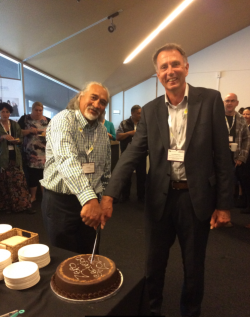National event marks ‘the beginning of the end’ for seclusion
District health board (DHB) teams from across the country joined mental health and addiction service consumers, the Health Quality & Safety Commission and Te Pou o te Whakaaro Nui (Te Pou), in Wellington this month, to begin the important work of the national collaborative, Zero seclusion: towards the elimination of seclusion by 2020.
The national workshop held on 7 March was the first meeting for the collaborative, providing an important opportunity to start planning the steps towards ending the use of seclusion. It featured presentations from key individuals within the mental health and addition sector, who helped to set the context for this area of work, providing a national and international perspective on the elimination of seclusion.
There was a strong focus on the role of consumers and families/whānau in supporting long term change, as well as an explanation of the quality improvement methodology that will drive the project. Attendees worked in groups looking at local implementation of the initiative and then provided feedback.
Clinical lead for the Commission’s mental health and addiction quality improvement programme, Dr Clive Bensemann, says the workshop meant everyone could hear and see first-hand what a quality improvement approach to eliminating seclusion looks and sounds like, and what needs to be done to scale up programmes and further improve the health system to achieve this goal.

Wi Keelan, Māori Kaumatua and cultural advisor and Clive Bensemann, clinical lead, mental health and addiction quality improvement programme celebrate the first meeting of the collaborative at the 7 March workshop.
The event also saw the introduction of the Commission’s new mental health and addiction Māori advisory group, who will work alongside the Commission, Te Pou, DHBs and consumers to improve the quality of mental health and addiction services in New Zealand.
Their involvement in this initiative is particularly important, said Wi Keelan, Māori Kaumatua and cultural advisor to the Commission’s mental health and addiction programme.
'It is important that Māori, who experience the highest rates of seclusion in New Zealand, feature effectively in the aspiration of the sector to eliminate seclusion by 2020. Setting this deadline brings greater hope for Māori who are particularly impacted by current restrictive practices. This will be imperative to achieving health equity, by eliminating disparities in their care.'
Te Pou chief executive Robyn Shearer says that New Zealand has made good progress towards reducing seclusion and restraint.
'We look forward to supporting the mental health and addiction Māori advisory group with this work so that this progress can continue.'
Roz Sorensen, manager for the Commission’s mental health and addiction quality improvement programme says feedback from participants on the day was positive.
'There was a really strong sense of commitment expressed on the day, as to the importance of achieving this aspirational goal, and a clear understanding that eliminating seclusion means improving safety and reducing harm, across our wider services.'
Participants from the workshop also shared their thoughts on the day (click the images below to go to the videos).
Simon Phillips, chief executive of the Maraeroa Marae Health Clinic reflects on the day and discusses the importance of making mental health a priority to achieve change.
Claudine Nepia-Tule, portfolio manager - mental health & addictions, MidCentral DHB talks about how the day has provided frameworks for improvement through improved collaboration.
Heather Casey, director of nursing, Southern DHB talks about how the team-approach is important for success in achieving the goal of zero seclusion.
Dean Rangihuna, Māori consumer advisor, Canterbury DHB talks about how relationships are important to achieve the goal of zero seclusion.
For more information about the zero seclusion project, click here.
